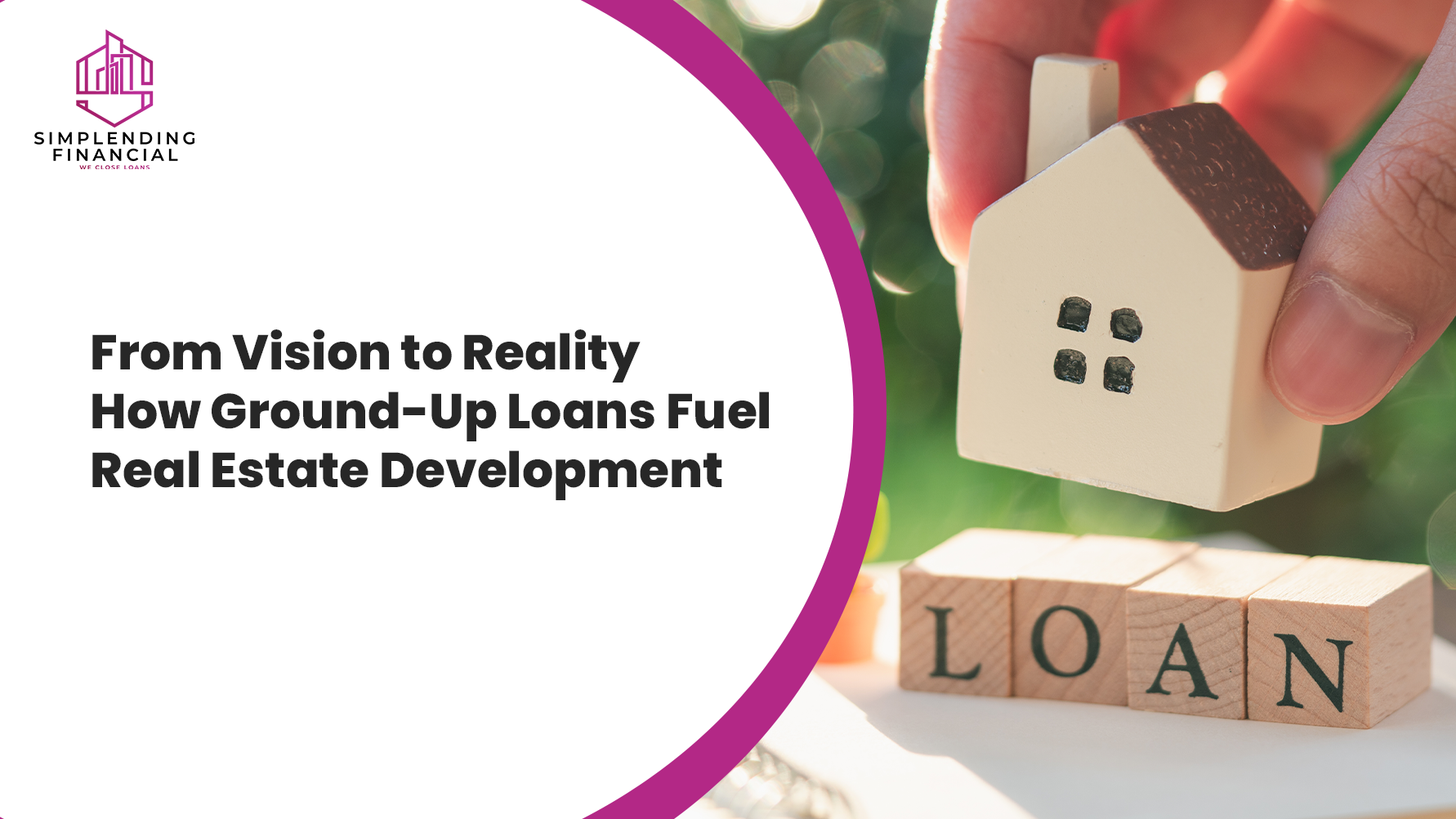From Vision to Reality How Ground-Up Loans Fuel Real Estate Development
02 Oct 2024
Posted By Admin
In the real estate development conversion of your ideas into tangible structure not only requires planning and creativity- rather it also demands financial backing. Ground-up loans play a pivotal role in this matter by providing financial help to real estate developers. With these loans, developers can start construction of new buildings from the ground up, by getting the desired funds. Today, we will talk about all the intricacies of ground up loans, its importance and how by these loans developers can give life to their visions.
Understanding ground up loans
Ground-up loans are especially designed for new construction work. Unlike other loans that provide acquisition and renovation loans for existing properties, ground-up solely helps new construction work. This covers cost for various tasks like land acquisition, construction materials, permit, labor and other related expenses. These loans have multiple types that include construction loans, permanent financing and bridge loans. Construction loans are disbursed for short duration and can be used during building phase. Bridge loan is temporary financing until long-term funding is secured. After project completion, developers usually convert the construction loan into permanent financing for enhanced stability.
Ground-up loans importance
Bridge the financial gap
Ground-up loans fill up the gap between initial construction work and the final outcome. Starting a real estate project requires high upfront investment and developers may not have sufficient amount in hand. By taking ground-up construction they can kickstart their projects, allowing them to purchase land, hire contractors and start the construction work without any delay.
Supporting economic growth
Ground-up loans stimulate economic growth. With new construction work, many job seekers get jobs not only in construction work but also in other industries like manufacturing, retail and logistics. By securing finances through ground-up loans, developers give their contribution towards economic growth by creating job and enhancing the goods and services demand.
Fostering innovation and sustainability
Through financial help builders get from the ground-up loans, developers can invest in technologically advanced and sustainable building practices. Currently many developers give preference to eco-friendly models and designs to reduce the environmental impact. Through ground-up loans developers can take loan for research, development and implementation of sustainable practices.
Tailored financing solutions
Through ground-up construction you can avail customized financing solutions to meet your needs. Lenders usually consider the factors like project’s location, scope, size, financial stability and experience of the developer. With this personalized strategy, developers can get capital that can fulfill their goals, making it easy for them to give reality to their vision.
How to secure ground-up loans?
This type of loans involves multiple-steps that include careful planning and preparation. Below is the step-by-step structure of this loan:
Project planning and feasibility study
Before applying for ground-up loan, developers must do research on project’s viability. This includes market analysis, zoning regulations, potential cost and return over investment. With this research you will increase your chances of securing a loan.
Creating a comprehensive proposal
After doing project planning, you must create a comprehensive proposal that should comprise of project’s scope, budget, timeline and expected results. This proposal will play a pivotal role while applying for funds, as it will reflect your commitment and preparedness.
Choose a suitable lender
Not all lenders are equal and you must look for the one that has experience in ground-up financing. Whether it is a credit union, a traditional bank or any other alternative, your lender must know the challenges of real estate developers. This will allow you to get the favorable loan terms.
Due Diligence and underwriting
Once you choose the suitable lender, you must undergo due diligence process. Under this process, your lender will consider the factors like project’s risk and your financial condition. This will include thorough consideration of credit history, previous project experience and financial statements. In-depth study of underwriting requirements, will expedite the process.
Closing and disbursement
After loan approval, developers will reach near to the closing phase, where they will finalize the terms and conditions. After closing, funds will be disbursed, and at this phase you can start the construction work. You must maintain a healthy communication with the lenders throughout the construction phase and give regular updates and address any issues.
Challenges and considerations
Ground-up loan is a boon for real estate industries, but it has its own set of challenges. Developers must handle the fluctuations in interest rates, construction delays and dynamic market conditions. Also, they must have robust cash flow to cover the cost during building phase. Also, lenders may require contingency plans to handle the unforeseen delays that may come during construction. With a strong risk management strategy, you can address such risks and secure the financing efficiently.
Conclusion
Ground-up loans work as a catalyst for real estate developers to give reality to their dreams. By knowing the process of availing ground-up loans, developers can resolve all their financial issues. With the continuous evolution of real estate market, developers can stand well in the crowd by making efficient usage of ground-up loans.


